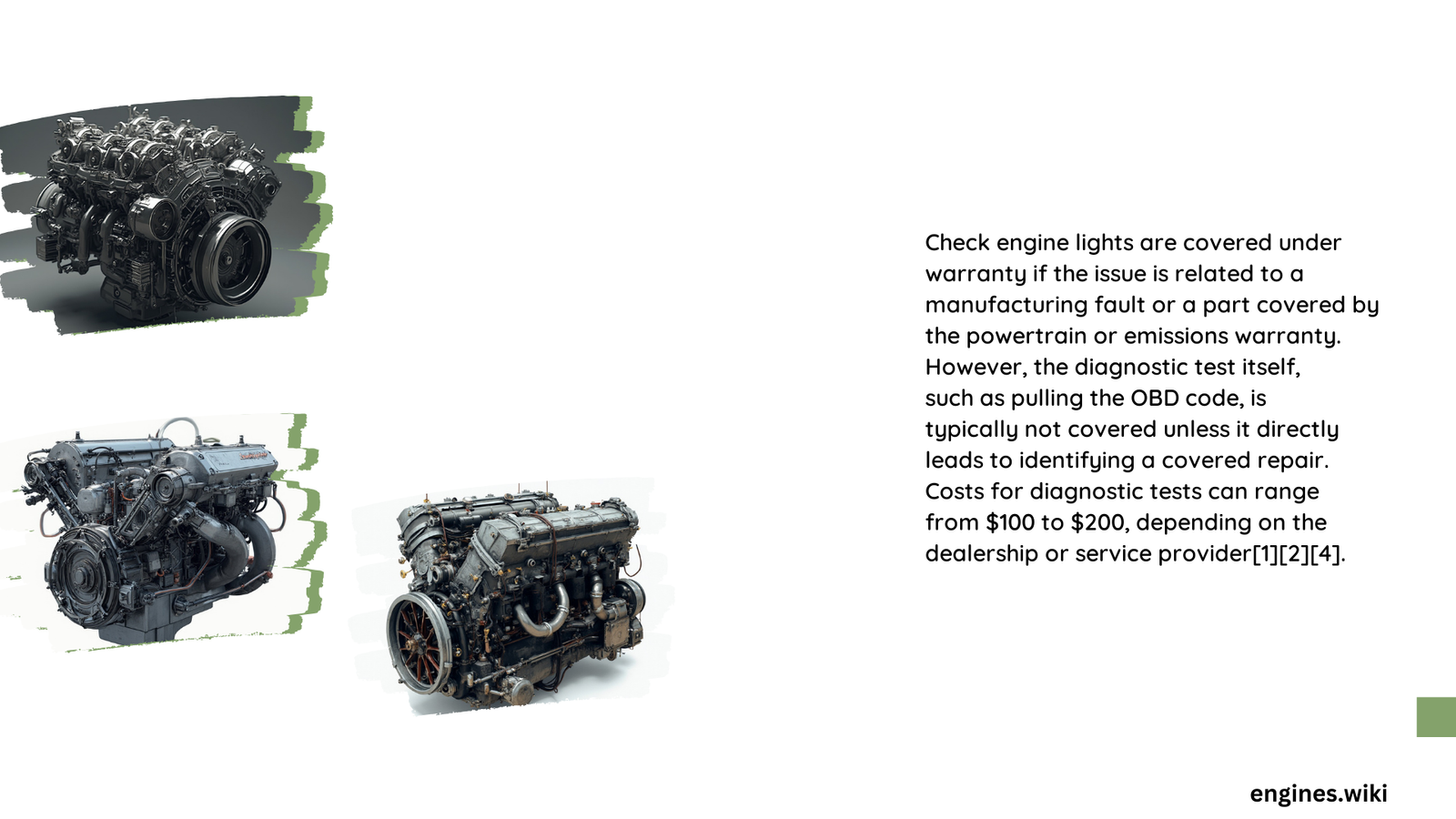Check engine lights can create uncertainty for vehicle owners, especially when unexpected repair costs loom. Warranty coverage for these diagnostic warnings varies significantly based on vehicle age, warranty type, and specific mechanical issues. Manufacturers and extended warranty providers have complex policies that determine whether repairs will be financially covered, making it crucial for car owners to understand their specific warranty terms and conditions.
What Determines Warranty Coverage for Check Engine Lights?
Check engine lights can be covered under warranty, but multiple factors influence the coverage:
Warranty Types and Coverage Scope
| Warranty Type | Coverage Extent | Typical Exclusions |
|---|---|---|
| Manufacturer Warranty | Defects in manufacturing | Wear and tear, maintenance issues |
| Extended Warranty | Varies by plan | Pre-existing conditions, non-factory equipment |
| Powertrain Warranty | Major engine components | Minor sensor replacements |
Key Factors Affecting Warranty Claims
- Vehicle Age
- Newer vehicles have more comprehensive coverage
-
Mileage limitations impact warranty status
-
Cause of Check Engine Light
- Manufacturing defects typically covered
-
User-induced damages often excluded
-
Diagnostic Verification
- Professional diagnosis required
- Detailed documentation necessary
How to Navigate Check Engine Light Warranty Claims?

Step-by-Step Claim Process
- Immediate Action
- Do not continue driving if check engine light appears
- Contact warranty provider promptly
-
Prevent potential additional damage
-
Professional Diagnosis
- Visit authorized repair facility
- Request comprehensive diagnostic report
- Obtain pre-authorization from warranty provider
Common Repairable Components
Check engine lights often indicate issues with:
– Oxygen sensors
– Catalytic converters
– Fuel system components
– Emissions control systems
– Electrical sensor networks
What Repair Costs Can You Expect?
Repair costs vary dramatically based on the specific issue:
| Component | Typical Repair Cost Range |
|---|---|
| Oxygen Sensor | $374 – $431 |
| Catalytic Converter | $1,000 – $2,500 |
| Fuel Injector | $500 – $1,200 |
| Engine Control Module | $1,000 – $1,800 |
Proactive Warranty Protection Strategies
- Maintain detailed service records
- Follow manufacturer’s recommended maintenance schedule
- Address warning signs immediately
- Understand warranty contract specifics
- Consider extended warranty options
Expert Recommendations
Vehicle experts suggest:
– Regular maintenance prevents many check engine light issues
– Early diagnostic intervention reduces potential repair costs
– Comprehensive documentation supports warranty claims
When Warranty Does Not Cover Repairs
Scenarios typically excluded from warranty:
– Modifications to original vehicle configuration
– Neglected maintenance
– Accidents or external damage
– Normal wear and tear
– Improper vehicle usage
Professional Insight
Automotive warranty specialists emphasize the importance of understanding individual warranty terms. Each contract has unique provisions, making it essential to review documentation carefully.
Final Considerations
While check engine lights can be covered under warranty, coverage depends on multiple complex factors. Vehicle owners must be proactive, maintain documentation, and communicate effectively with warranty providers.
Recommended Actions
- Review warranty contract thoroughly
- Maintain regular vehicle maintenance
- Address warning signs promptly
- Keep comprehensive service records
Reference:
– Endurance Warranty
– Kelley Blue Book
– Automotive Repair Resources
